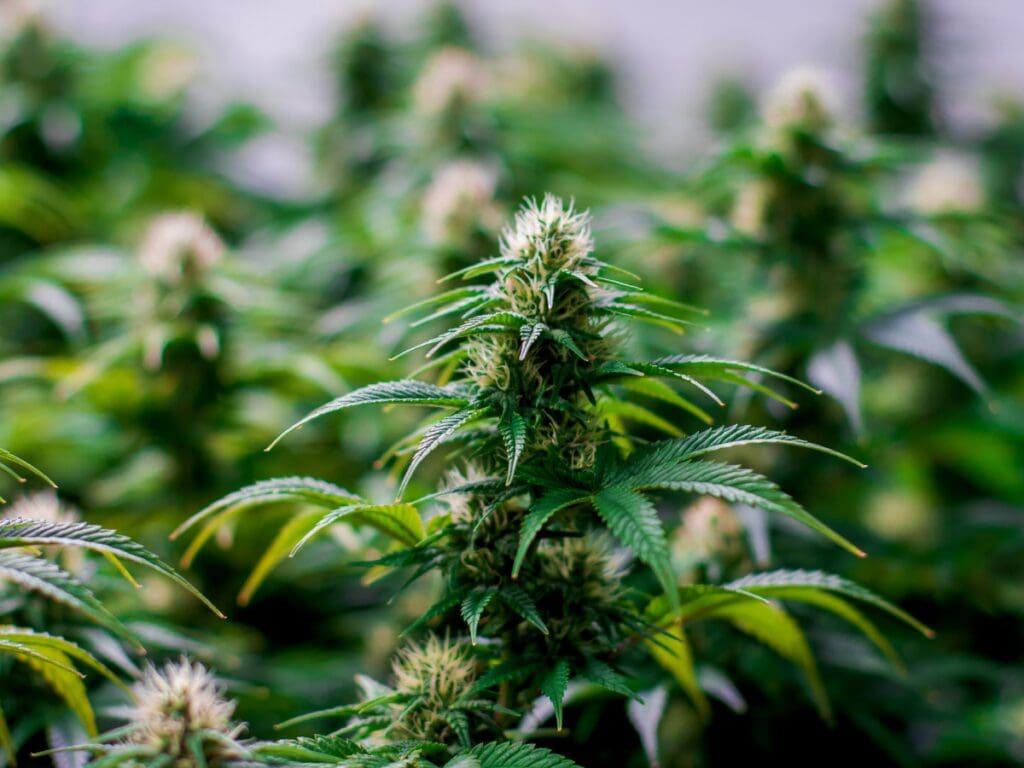Key Takeaways:
- CBG as the “Mother of Cannabinoids”: CBG is the precursor to CBD, THC, and other cannabinoids, offering targeted benefits like anti-inflammatory effects.
- CBG vs. CBD Effectiveness: While CBG directly interacts with receptors, CBD is known for its broader, balancing properties.
- Choosing the Right Cannabinoid: Whether you prefer CBG, CBD, or a combination, both offer unique wellness advantages tailored to your needs.
CBG and CBD are two of the most talked-about cannabinoids in the wellness space, but there’s growing buzz around whether CBG might be the stronger, more effective option. Often called the “mother of all cannabinoids,” CBG is the precursor to many other cannabinoids, making it unique and increasingly sought after. But how does it compare to CBD, a household name known for its calming and balancing effects?
At Happy Hemp, we’re proud to be a trusted source for high-quality hemp-derived products that prioritize your well-being. With an extensive range of CBD oils, gummies, and innovative products featuring cannabinoids like CBG, we’re dedicated to delivering the best in transparency and quality.
This article will break down the differences between CBG and CBD, highlight their unique benefits, and help you decide which cannabinoid might suit your needs best. Let’s dive in!
What Are CBG And CBD?
CBG (cannabigerol) and CBD (cannabidiol) are two non-psychoactive cannabinoids derived from the cannabis plant, meaning they won’t produce the “high” associated with THC. CBG is often referred to as the “mother of all cannabinoids” because it serves as the precursor to other cannabinoids like CBD, THC, and CBC. However, as the plant matures, most CBG is converted into these compounds, leaving only trace amounts. This rarity has sparked significant interest in CBG for its potential wellness applications.
CBD, by contrast, is more abundant and widely recognized for its calming effects and potential benefits, including anxiety reduction, pain management, and improved sleep. It is commonly available in products like oils, tinctures, and gummies, making it more accessible than CBG. While both cannabinoids interact uniquely with the body’s endocannabinoid system, their distinct properties cater to different needs, making them valuable for various wellness goals.
How CBG And CBD Work In The Body
CBG (cannabigerol) and CBD (cannabidiol) interact with the body through the endocannabinoid system (ECS), a critical network that regulates mood, appetite, sleep, and immune function. While both cannabinoids support the ECS, they do so through distinct mechanisms, leading to unique effects and applications. Understanding these differences is key to appreciating their roles in promoting overall wellness.
CBG’s Direct Interaction With Ecs Receptors
CBG works by directly binding to CB1 and CB2 receptors within the ECS. This direct interaction allows it to produce targeted effects that may act quickly in addressing specific issues. Studies suggest that this direct binding contributes to CBG’s potential in reducing inflammation, relieving pain, and offering antibacterial benefits.
CBD’s Indirect Influence On The Ecs
Unlike CBG, CBD takes an indirect approach to influencing the ECS. Instead of binding to the receptors, it enhances the body’s ability to produce and maintain natural endocannabinoids. This mechanism helps restore balance in the ECS, contributing to CBD’s reputation for reducing stress, improving sleep quality, and easing chronic pain in a broad and consistent manner.
Comparing Speed And Specificity Of Effects
CBG’s direct receptor binding has led researchers to consider its potential for faster-acting or more condition-specific benefits. This makes it particularly intriguing for targeted therapies, although further research is needed. CBD, with its indirect influence, offers more gradual and systemic benefits, which explains its appeal as a versatile wellness tool.
Implications For Wellness And Research
The unique ways CBG and CBD work in the body highlight their complementary roles in wellness. CBG’s precision and speed make it promising for acute issues, while CBD’s broad-spectrum effects cater to ongoing needs like stress management and sleep improvement. Both cannabinoids remain the focus of extensive scientific study, with promising insights on the horizon.
Comparing The Strength Of CBG And CBD
The relative strength of CBG (cannabigerol) and CBD (cannabidiol) depends on their specific applications and individual needs. Both cannabinoids interact with the body’s endocannabinoid system (ECS) in unique ways, offering different benefits. Understanding these distinctions helps clarify which cannabinoid might be more effective for certain conditions or wellness goals.
CBG’s Targeted Potency
CBG is often regarded as more potent for specific conditions due to its direct binding with CB1 and CB2 receptors in the ECS. This direct interaction allows it to act more precisely on issues such as inflammation and pain, potentially offering quicker relief. Additionally, studies suggest that CBG’s antibacterial properties might surpass CBD’s, making it a promising candidate for addressing microbial and bacterial health challenges.
CBD’s Broad-Spectrum Effectiveness
CBD’s indirect mechanism of action on the ECS lends itself to a more comprehensive and balanced impact on overall well-being. Instead of binding directly to ECS receptors, CBD enhances the production of the body’s natural endocannabinoids, promoting equilibrium in the system. This approach makes CBD especially effective for managing stress, anxiety, and sleep disturbances without overwhelming the user with strong, immediate effects.
Context Matters In Defining Strength
When comparing the strength of CBG and CBD, it’s important to consider the context of use. CBG’s precise and direct effects may feel stronger for acute or localized issues, such as neuroinflammation or targeted pain relief. On the other hand, CBD’s subtle yet wide-reaching benefits make it a more versatile choice for individuals seeking long-term balance and general wellness support.
Personal Needs Shape Effectiveness
Ultimately, the strength of CBG versus CBD hinges on personal health goals and how the cannabinoids are used. For individuals needing targeted and rapid results, CBG may stand out as a stronger option. However, CBD’s well-documented versatility and its ability to address a range of conditions with a calming effect make it an invaluable tool for holistic health management.
CBG’s Potential Benefits
CBG (cannabigerol) offers a range of potential health benefits due to its unique interaction with the body’s endocannabinoid system. Emerging research highlights its ability to address various conditions, from inflammation to appetite loss, making it a promising cannabinoid in the wellness space. Below are some of the most notable potential benefits of CBG:
- Anti-inflammatory Properties: CBG has demonstrated promise in reducing inflammation, which could benefit individuals with conditions such as arthritis or inflammatory bowel disease (IBD).
- Neuroprotective Effects: Preliminary research suggests CBG may protect nerve cells, positioning it as a potential therapeutic option for neurodegenerative conditions like Huntington’s disease.
- Antibacterial Strength: Studies indicate CBG’s potent antibacterial properties, including its ability to combat drug-resistant bacteria such as MRSA, making it a compelling option for fighting infections.
- Appetite Stimulation: Research suggests CBG may stimulate appetite, offering potential support for those struggling with appetite loss due to medical conditions or treatments.
CBD’s Potential Benefits
CBD (cannabidiol) is celebrated for its wide-ranging therapeutic effects, making it a popular choice for managing various physical and mental health conditions. Its ability to interact with the body’s endocannabinoid system in a gentle yet impactful way has led to numerous wellness applications. Below are some of CBD’s most notable potential benefits:
- Stress and Anxiety Relief: Known for its calming properties, CBD is widely used to reduce anxiety levels and improve mood, offering a natural way to manage stress.
- Pain Management: CBD is frequently sought for relief from chronic pain conditions, including migraines, fibromyalgia, and muscle soreness, helping to enhance daily comfort.
- Improved Sleep: By encouraging relaxation, CBD can enhance sleep quality and duration, making it a valuable option for those dealing with insomnia or sleep disruptions.
Seizure Control: CBD’s ability to reduce seizures, particularly in conditions like epilepsy, is well-documented and has even been approved in certain prescription medications.
Which One Should You Choose?
Deciding between CBG and CBD depends on your individual needs and health goals. Each cannabinoid offers unique benefits, and understanding their strengths can help you make an informed decision. By assessing your priorities and the specific outcomes you seek, you can determine which cannabinoid—or combination—might be the most effective for your wellness journey.
Choosing CBG For Targeted Relief
CBG is ideal if you’re seeking precise, targeted support for specific conditions. Its anti-inflammatory properties make it promising for issues like arthritis or inflammatory bowel disease, while its neuroprotective effects may benefit individuals with neurodegenerative diseases such as Huntington’s disease. Additionally, CBG’s antibacterial strength and ability to stimulate appetite offer added value for those addressing microbial health challenges or appetite loss.
Opting For CBDs Broad Wellness Benefits
CBD is a better choice if you’re looking for general wellness support and long-term balance. Its calming effects are widely recognized for managing stress and anxiety, making it suitable for individuals with high emotional or mental demands. Moreover, CBD’s broad-spectrum benefits include improved sleep quality and effective pain relief, with extensive research supporting its use for conditions like insomnia and chronic pain.
Combining Both For Synergistic Effects
If you’re uncertain about choosing between CBG and CBD, a combination of the two might be the best option. Products that blend these cannabinoids can leverage the “entourage effect,” a phenomenon where multiple cannabinoids work together to enhance each other’s benefits. This synergy can provide both targeted and systemic effects, offering a comprehensive approach to wellness that covers a broader range of needs.
Tailoring Your Choice To Individual Goals
Ultimately, the decision between CBG and CBD comes down to how your body responds and the specific outcomes you want to achieve. Experimenting with different products, starting with low doses, and consulting with a healthcare professional can help guide your choice. Taking the time to evaluate your personal needs will ensure you select the cannabinoid that aligns best with your wellness objectives.
Final Thoughts
The question of whether CBG is stronger than CBD depends on how “stronger” is defined. CBG’s direct interaction with the endocannabinoid system may make it more effective for targeted issues like inflammation, neuroprotection, and bacterial infections. Meanwhile, CBD’s broader effects, including stress relief, pain management, and sleep support, make it a preferred choice for general wellness. Both cannabinoids excel in different areas, making their effectiveness context-dependent.
Rather than choosing one over the other, many people find that combining CBG and CBD offers a more balanced and comprehensive approach to wellness. Products that blend these cannabinoids leverage their unique strengths, creating synergistic effects that enhance their benefits. Ultimately, your body and health goals will guide the decision, and experimenting with different options can help you find the best fit for your needs.
Read also:
- Migraine Relief Made Possible with CBD: A Guide to Natural Solutions
- How CBD Can Promote Relaxation and Stress Relief
- PTSD Relief Through CBD: A Comprehensive Guide
Frequently Asked Questions About CBG And CBD
What does CBG stand for?
CBG stands for cannabigerol, a lesser-known cannabinoid found in the cannabis plant. It is often called the “mother of all cannabinoids” because it acts as a precursor to other cannabinoids like CBD and THC.
Is CBG better for pain than CBD?
CBG may be better for localized pain due to its direct interaction with CB1 and CB2 receptors. However, CBD is also highly effective for chronic and widespread pain management.
Can CBG and CBD be used together?
Yes, CBG and CBD can complement each other when used together. Combining them can enhance their effects through the entourage effect, making them a popular choice in full-spectrum products.
Why is CBG less common than CBD?
CBG is found in much smaller amounts in the cannabis plant, as most of it converts to other cannabinoids like CBD and THC during growth. This scarcity makes it less common and often more expensive.
Are there side effects of using CBG?
CBG is generally well-tolerated, but potential side effects could include dry mouth, fatigue, or changes in appetite. Always start with a small dose to gauge your reaction.
Is CBG legal like CBD?
Yes, CBG is legal in many regions where hemp-derived products are allowed, provided it contains less than 0.3% THC. Always check local regulations to be sure.
Can CBG help with focus?
Some users report that CBG helps improve focus and mental clarity. Its interaction with CB1 receptors may play a role in enhancing concentration.
How does the price of CBG compare to CBD?
CBG is generally more expensive than CBD due to its scarcity and the difficulty in extracting large amounts from the cannabis plant.
Can pets benefit from CBG like CBD?
Yes, CBG is safe for pets in appropriate doses and may help with issues like inflammation or appetite stimulation. Consult a veterinarian before using it.
Are there different ways to take CBG and CBD?
Both CBG and CBD can be consumed in various forms, including oils, tinctures, gummies, capsules, and topicals. Choose a method based on your needs and preferences.
Sources:
- Pamplona, F. A., da Silva, L. R., & Coan, A. C. (2018). Potential Clinical Benefits of CBD-Rich Cannabis Extracts Over Purified CBD in Treatment-Resistant Epilepsy: Observational Data Meta-analysis. Frontiers in Neurology, 9. https://doi.org/10.3389/fneur.2018.00759
- Williams, C., & Nutbrown, D. (2021). A Review of Research into the Health Benefits of Cannabidiol (CBD). https://www.theneighborhoodacademy.org/editoruploads/files/Carrington_Williams_-_Review_of_CBD_Health_Benefits.pdf
- White, C. M. (2019). A Review of Human Studies Assessing Cannabidiol’s (CBD) Therapeutic Actions and Potential. The Journal of Clinical Pharmacology, 59(7), 923–934. https://doi.org/10.1002/jcph.1387
- Nachnani, R., Raup-Konsavage, W. M., & Vrana, K. E. (2021). The Pharmacological Case for Cannabigerol. The Journal of Pharmacology and Experimental Therapeutics, 376(2), 204–212. https://doi.org/10.1124/jpet.120.000340
- Potential Medical Uses of Cannabigerol: A Brief Overview. (2017). Handbook of Cannabis and Related Pathologies, 958–967. https://doi.org/10.1016/B978-0-12-800756-3.00115-0









